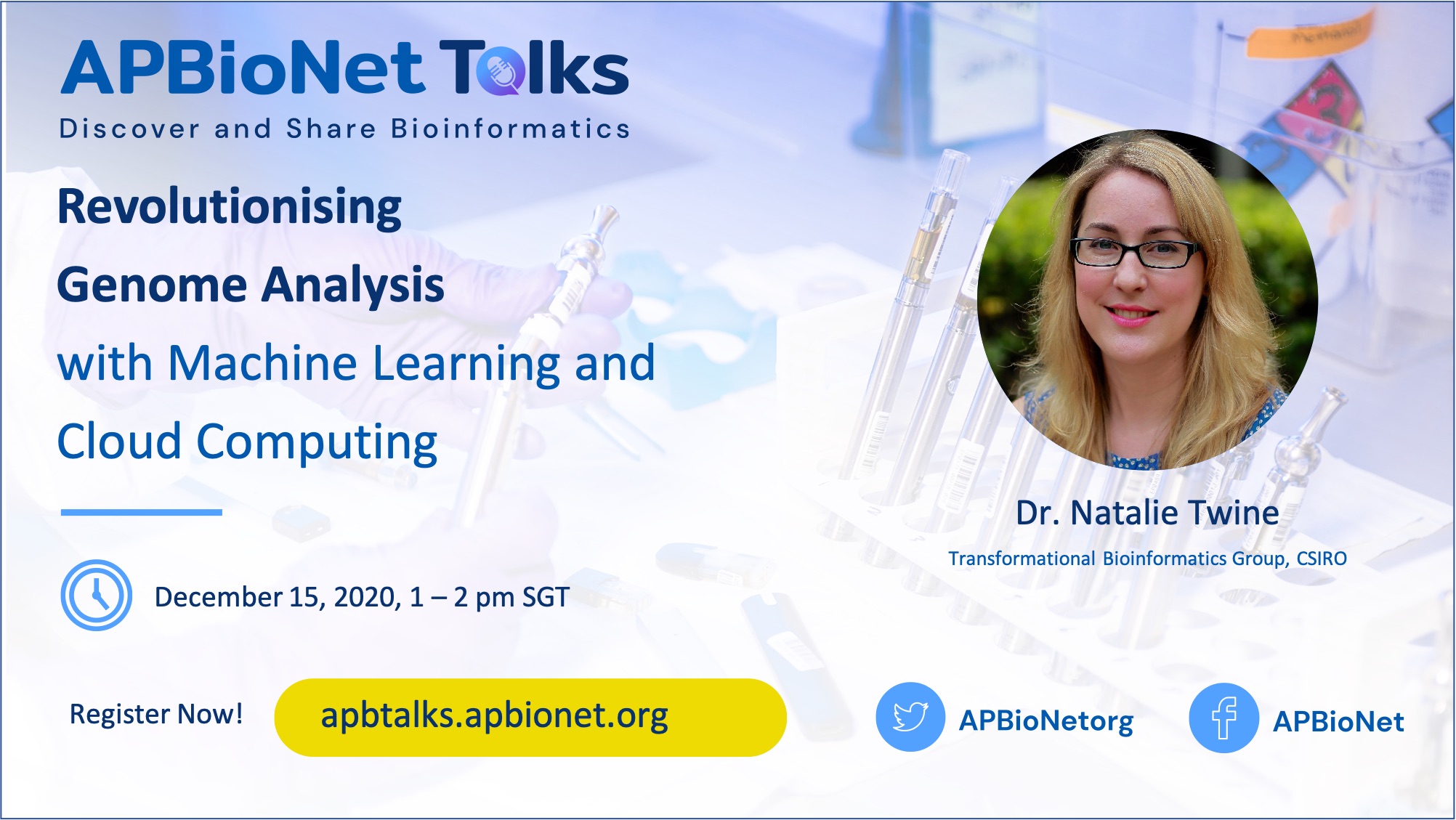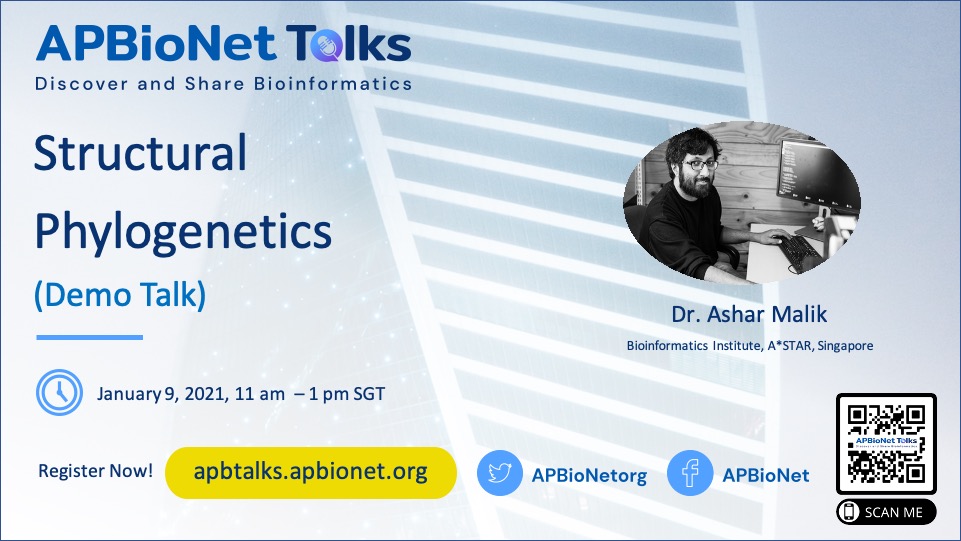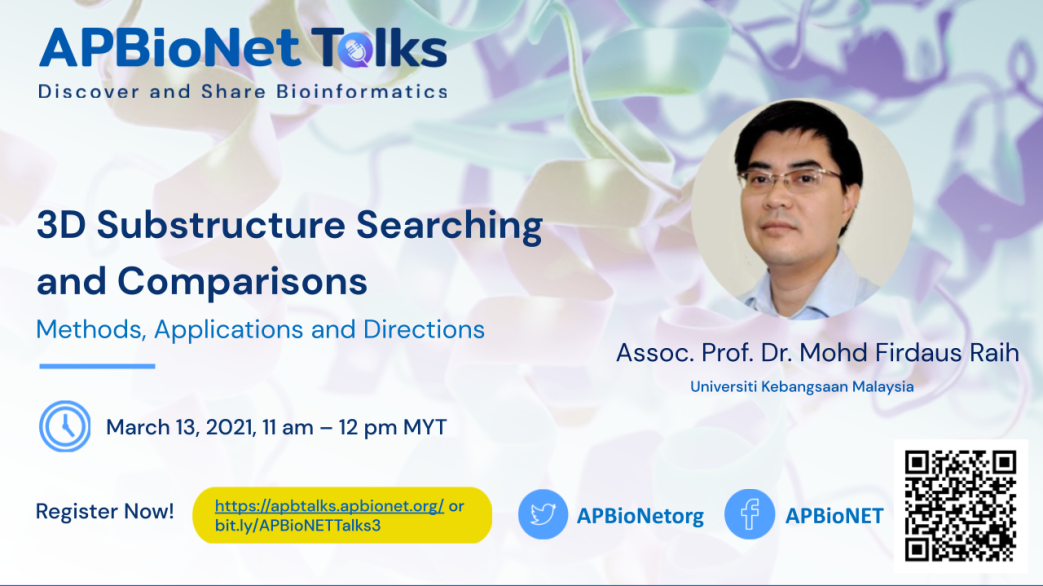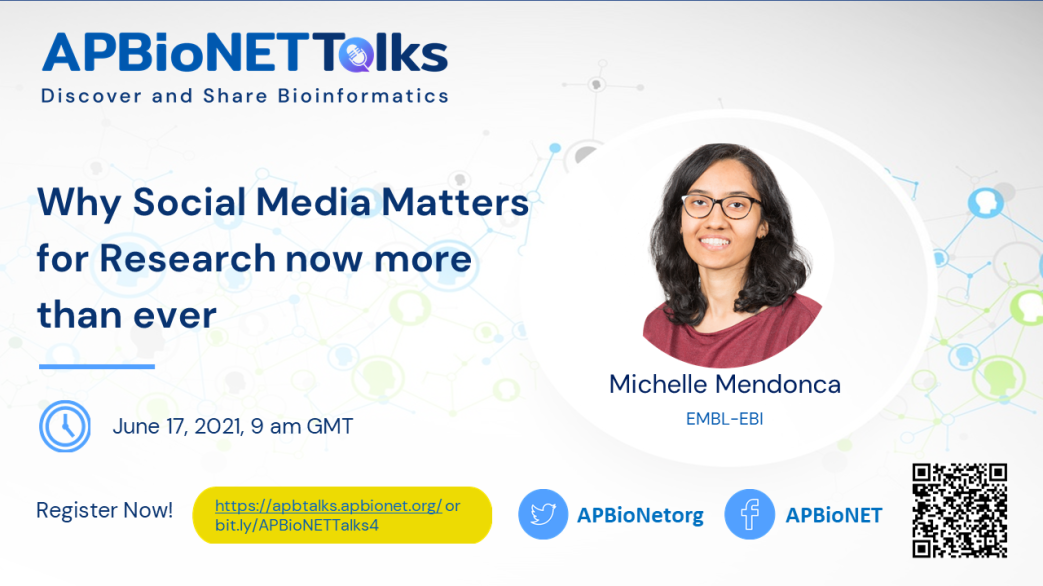This is a community initiative brought to you by Asia-Pacific Bioinformatics Network (APBioNet). It aims to provide an online avenue to showcase bioinformatics related talks, tutorials, and training. The program aims to make the learning of bioinformatics more engaging, inclusive and accessible. We will invite experts, early career researchers/scientists, and Ph.D. students to share their knowledge and skills. If you are interested to contribute, do get in touch with us. The videos will be live-streamed and be made available for later viewing. This materials will serve as an open bioinformatics resource for the community. In the process, we hope to promote the discovery and sharing of bioinformatics. Video-based learning resources for bioinformatics are still scarce. Some of them are not available in English. If available, they are not free. Even if they are free, they usually only cover the introduction aspects, with very basic discussions. Most of the specific and intermediate-to-advanced discussions or skills are usually not available. This hampers the learning of bioinformatics in solving complex biological problems. Through APBioNetTalks, we hope to contribute to bridge this gap by providing an open access video-based bioinformatics learning resources for the community.
Let us know what you think: share your thoughts on our services via email, Twitter or Facebook.
Become a supporting member: be a part of Asia Pacific bioinformatics community. Find out more about us on our website.
Speaker: if you are passionate about sharing the latest developments and/or know-how in your area of expertise to the community, we welcome you to contribute a talk/demo/tutorial/workshop to APBioNetTalks. Please help complete this form, which would capture all the relevant information we need. You can make multiple submissions if you are keen to contribute more.
Moderator: If you are interested in being a moderator for a talk/demo/workshop according to your areas of interest or expertise, please fill this form.
Organising or Scientific committee members: Join our team to bring inclusive and open-access learning avenue for scientific community. Note that this is a pro bono. With your support, we hope we can continuously provide inclusive and accessible contents for you. We believe that open science will make research more reproducible, more transparent and more collaborative. Apply here.
We are committed to providing a welcoming and inspiring platform for all. Please follow our code of conduct in all kind of activities related to APBioNetTalks.
Dr. Natalie Twine, Transformational Bioinformatics Group, CSIRO
Highlight:
APBioNetTalks was inaugurated on 15th December 2020 (Monday), featuring our first speaker Dr. Natalie Twine from Transformational Bioinformatics Group, CSIRO. The talk started with opening remarks by one of the founders of APBioNet, Assoc. Prof. Tan Tin Wee from the National University of Singapore (NUS). He highlighted the need to spread bioinformatics throughout the Asia Pacific region and beyond, and was pleased to see the younger generation driving the current initiatives of APBioNet, something which is much needed for sustainability.
The sessions continued with our first APBioNetTalks entitled “Revolutionising genome analysis with machine learning and cloud computing”. Dr Twine provided an insider’s view into the development of a Spark-based machine learning framework that is able to find disease genes among the three billion letters of the human genome. She also covered a new software, TRIBES, developed to uncover distant relatedness in genomic data. Knowing relationship status is important for diagnosing and treating genetic diseases. Dr. Twine showcased how technology has been used to understand and find treatments for motor neurone disease. Finally, she showcased hot-off-the-press cloud-native technology, where CSIRO has advanced the response to COVID-19 through digital health.
You can view the full talk on our YouTube channel: https://www.youtube.com/watch?v=AQrXVbVD-9s
Dr. Ashar Malik, Bioinformatics Institute, ASTAR, Singapore
Highlight: Our second APBioNETTalks, which was a demo, took place on January 9, 2021 entitled “Structural Phylogenetics” and was delivered by Dr. Ashar Malik of Bioinformatics Institute, A*STAR, Singapore.
The session provided a comprehensive yet accessible overview on sequence and structural phylogenetics. Dr. Ashar covered various topics under the theme, including pipelines and tools to use for performing evolutionary analysis, different kinds of statistical methods and phylogenetic tree generation approaches. He also provided a quick demo on how to utilize the command line interface for structure and sequence comparisons, as well as for tree generation.
The talk was live-streamed on APBioNET YouTube channel and is also available for later viewing, in case you could not attend the talk or would like to revisit or share it with others: https://youtu.be/yQZA47jiI3s
Do subscribe to be notified on future talks.
Assoc. Prof. Dr. Mohd Firdaus Raih, Universiti Kebangsaan Malaysia
Highlight: The third APBioNETTalks held on March 13, 2021 was presented by Assoc. Prof. Dr. Mohd Firdaus Raih of Universiti Kebangsaan Malaysia. The talk entitled “3D substructure searching and comparisons: methods, applications and directions” showcased the importance of comparing the substructure similarity of proteins and RNA molecules. Dr Firdaus and his team developed several tools to allow analysis of the PDB structure to annotate and characterise substructure similarities in known proteins. He categorically highlighted the advantage of using graph theory concepts and their applications in unraveling the “gems” hidden in the protein's structure. His talk emphasised the application of substructure study in areas of drug repositioning in cancer and infectious diseases, novel motif prediction, and modeling evolutionary trajectories.
If you missed the talk, you can rewatch it here: https://youtu.be/cs6xf-98kj0
Do subscribe to our YouTube channel and APBioNET newsletter in order to not miss upcoming APBioNET events.
Michelle Mendonca, EMBL-EBI
Highlight: Our fourth APBioNETTalks took place on June 17, 2021 entitled “Why social media matters for research now more than ever” and was delivered by Michelle Mendonca of EMBL-EBI. In this talk, we learned from Michelle’s experience as the Digital Strategy Officer at EMBL-EBI on the advantages of social media in science and research communication. More and more researchers and research institutions have turned to social media to build their brand and promote their research. Michelle also provided an example on how social media can be used to build a successful research community. She shared some “dos and don’ts” in using social media to build a strong digital presence.
Rewatch this talk on our YouTube channel and subscribe: https://youtu.be/LgYM75rUNnI
Creator:
- Hilyatuz Zahroh
- Mohammad Asif Khan
Program coordinator (2020-present): Hilyatuz Zahroh
Scientific Committee: Mohammad Asif Khan
Recurring Contributors:
- Li Chuin Chong
- Debangana Chakravorty
- Deeksha Pandey
- Rizkyana Avissa
- Sharanya Manoharan
- More to come..




